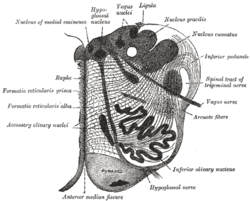Nucleus raphe obscurus
| Nucleus raphe obscurus | |
|---|---|
 Section of the medulla oblongata at about the middle of the olive. (Raphe nuclei not labeled, but 'raphe' labeled at left.) | |
| Details | |
| Identifiers | |
| Latin | nucleus raphes obscurus |
| MeSH | D065849 |
| NeuroNames | 740 |
| NeuroLex ID | birnlex_1369 |
| TA98 | A14.1.04.319 |
| TA2 | 6037 |
| FMA | 72585 |
| Anatomical terms of neuroanatomy | |
The nucleus raphe obscurus is one of the medullary raphe nuclei. It is located caudal to the nucleus raphe magnus. The nucleus raphe obscurus projects to the cerebellar lobes VI and VII and to crus II along with the nucleus raphe pontis.[1]
The nucleus raphes obscurus has also been implicated in the modulation of the hypoglossal nerve. It has been observed that the ablation of this nucleus causes a change in the firing pattern of this cranial nerve.[2]
In addition, the nucleus raphe obscurus mediates expiration via the effect of serotonin and depresses periodic synaptic potentials.[3] It has also been shown that this nucleus stimulates gastrointestinal motor function; microinjections of 5-HT into the nucleus raphe obscurus increase gastric movement.[4]
See also
[edit]References
[edit]- ^ Brodal, A (1981). Neurological Anatomy in relation to Clinical Medication (3rd ed.). Oxford Press. ISBN 978-0195026948.
- ^ Peever, JH; Necakov, A; Duffin, J (2001). "Nucleus raphé obscurus modulates hypoglossal output of neonatal rat in vitro transverse brain stem slices". Journal of Applied Physiology. 90 (1): 269–279. doi:10.1152/jappl.2001.90.1.269. PMID 11133919.
- ^ Lalley, PM; Benacka, R; Bischoff, AM; Richter, DW (1997). "Nucleus raphe obscurus evokes 5-HT-1A receptor-mediated modulation of respiratory neurons". Brain Research. 747 (1): 156–159. doi:10.1016/S0006-8993(96)01233-4. PMID 9042541.
- ^ Krowicki, ZK; Hornby, PJ (1993). "Serotonin microinjected into the nucleus raphe obscurus increases intragastric pressure in the rat via a vagally mediated pathway". Journal of Pharmacology and Experimental Therapeutics. 265 (1): 468–476. PMID 8097247.
